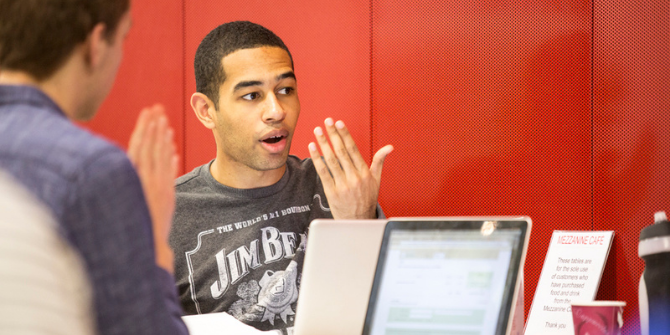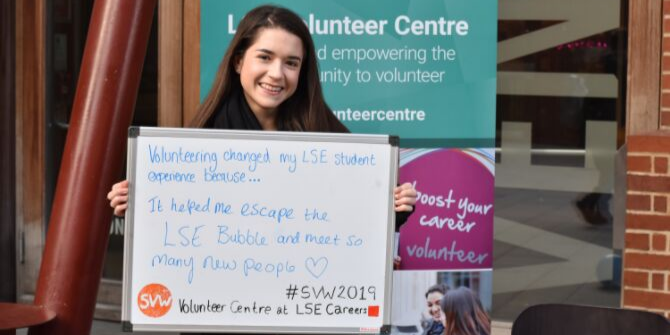Welcome to LSE, so much to do, enjoy and learn!
Even now, right at the start of term, lots of LSE students are already talking about Spring Weeks. It’s only natural you might then start thinking “I must apply and keep up with my peers” or ‘I need to do a spring week to get on the career ladder”. But just hang on a minute! Spring weeks are certainly not the only route to a job and only apply to a small number of employers and sectors. There are lots of different ways you can gain relevant work experience. So let’s look at this in a bit more detail.
Well firstly don’t panic or rush into making a large number of applications you’ve not had time to properly research. If you want to work in the banking and finance sectors, a Spring Week experience will indeed be useful, but it’s not the only route into employment. Be reassured that valuable work experience comes in many forms, and whilst Spring Weeks or summer Internships are a route in to some of the larger employers, it’s also worth exploring a wider range of opportunities that will help you grow, develop and enable you to make the best career choices.
So why is work experience so important?
Gaining work experience is a key element in your career planning, and LSE Careers can help you develop your strategy whilst balancing all the other demands on your time. Whether you are a first, second, third year undergraduate or a master’s student, seeking quality work experiences will:
- provide the vital bridge between your education and your career
- help you apply your academic learning to solve real world problems or deliver real results
- allow you to build your commercial awareness
- broaden and deepen your technical knowledge or skills
- help you develop a set of skills you can apply to a wide range of roles, organisations or sectors
- ensure you are able to make informed long-term career decisions
- build your network of contacts
- give you confidence and make you more comfortable in the workplace.
Anyone, at any stage in their career, can really benefit from gaining work experience. Here’s a quick guide to some of the main ways that you can get it.
| First Year
Undergraduate |
Second Year
Undergraduate |
Third Year
Undergraduate |
Post
Graduate |
|
| Spring weeks | x | |||
| Insight, discovery days or open evenings | x | x | x | |
| Dinners and networking events | x | x | x | x |
| Internships or summer placements | x | x | x | |
| Micro or virtual internships | x | x | x | x |
| Research projects | x | x | x | x |
| Short term contract/ temporary roles | x | x | x | x |
| Part time work during study | x | x | x | |
| Volunteering | x | x | x | x |
| Shadowing | x | x | x | |
| Office presentations or industry talks | x | x | x | x |
| Case study or skills sessions | x | x | x | x |
Here’s the lowdown on some of the different types of work experience:
Spring Weeks
What is a Spring Week? A placement providing an introduction to the organisation and its work. These are often called vacation schemes in the legal profession. It may include completing a case study, shadowing different people, attending meetings, skills training, social activities, Q & A sessions or a specific piece of project work to be completed either individually or as a team.
When? Usually during the Easter vacation.
Who offers them? Banks and Investment/PE companies, Financial Services, Consultancies and some large Corporates, including Deloitte, KPMG, Barclays, Credit Suisse, Macquarie, Shell, Bank of America etc.
What do you need to know? Spring Weeks are very competitive, so you really shouldn’t wait for deadlines. Many organisations recruit on a rolling basis and because they want to find the best candidates with the highest potential they will make appointments on a first come first served basis. You could be asked to select a specific department to provide a focused experience or you may be offered a rotation between departments.
Will I get paid? You will receive an allowance to cover expenses, but do not expect to receive a salary payment.
Why do it? If you have been successful during a Spring Week, you may be fast tracked to the next stage in the application process for a permanent role, which is usually a summer internship completed the year before graduation. So, a Spring Week gives you a taste of what it would be like to work in the organisation, the culture, the people, the clients and the opportunities.
Insight or Discovery Days, Open Evening and Networking Events
What are these? Usually a one-off event providing you with an opportunity to visit the organisation, to meet with employees and learn about the work, the roles, the training and or the recruitment processes. Some organisations now offer open days rather than attending university careers fairs as a way of giving you a more immersive experience.
When? Many invitations are sent out during Michaelmas Term, but you should keep an eye on specific organisations’ websites and on CareerHub throughout the year.
Who offers them? Banks, consultancies, law Firms and organisations with large graduate programmes.
What do you need to know? You need to be proactive in finding these, and selective in choosing the most useful experiences. Remember to do your research on the organisation in advance. Be prepared to be observed during your visit and think about ways to create a good impression.
Will I get paid? No.
Why do it? These events are great for networking and are a key part of your careers research strategy. You’ll come away with a much clearer view on whether or not this organisation is one to which you want to apply, and if you have been particularly engaging, they may even have suggested you send in a CV.
Internships, micro-internships and virtual internships
What is an internship? A longer period of work experience usually between 6-12 weeks that enables you to put everything you’ve learned into action. It may require you to complete specific pieces of work, or projects, or undergo some assessment at the end. You may be part of a cohort of interns or in a stand-alone role where you have responsibility for your own results.
Micro internships are also relatively new developments that offer short, sharp exposure to different sectors and employers. Many of these are unpaid work experience opportunities and are often suited to those who are unable to take advantage of a full internship.
Virtual internships usually require regular part time working, but are flexible remote assignments that fit around your existing commitments and location.
When? Usually during the summer vacation between second and third year for undergraduates, although internship opportunities are available to graduates and postgraduates.
Who offers them? Most large private sector, public sector, government, international organisations and NGOs or charities.
What do you need to know? Some are unpaid. You will need to be available for the full period of the internship which could restrict your holiday plans!
Will I get paid? Yes, in most cases, although rates will vary but if you have applied for an EU, government or international NGO most internships are advertised as unpaid.
Why do it? It’s good for you and for your CV. Internships expose you to a wide range of new people and enable you to deliver some tangible outputs. Sometimes an internship will translate into a permanent job offer.
Work Shadowing
What is shadowing? An opportunity to follow a member of staff for any time from a day to a week, as they go about their daily business. Shadowing enables you to observe the organisation and understand the kind of work you could be doing. You may attend meetings, visit clients and watch projects or production. You will also be expected to show a genuine interest and to ask questions.
When? Any time throughout the year.
Who offers them? Most organisations are open to offering a shadowing experience especially if you have a personal connection with someone and they have the resources. However, some organisations require a security clearance for non-employees to be in their premises or observing their work, so this may not be possible.
What do you need to know? You need to be aware that you are being given a unique opportunity so show your appreciation for the time that is being given to you, and try not to add to the work of the person you are shadowing.
Will I get paid? No.
Why do it? See the organisation in action and better understand what is involved in a specific role. You will also make contacts with whom you can follow up after your shadowing experience.
Other Work Experience Opportunities
- Some organisations will offer a training session to help you build specific skills for their sector, or they may provide a case study exercise that you and others can complete with their advice and support. These may take place in their offices or as part of the LSE Careers Events
- Presentations, conferences and industry talks are also great opportunities to network and develop your commercial awareness. Try to connect with people you have met via LinkedIn after the event as they may prove to be useful contacts in the future.
- Short term, contract, project or temporary roles which are not official internships are equally useful in building your transferable skills and providing exposure to new sectors or organisations, so use your vacation or free time to explore these ways of gaining valuable experience.
- If you can’t manage a vacation role, perhaps you could consider doing some part time work during your studies which will add to your bank of skills, such as research, tutoring, customer relations or business development.
- Volunteering is a chance to give something back or to help others, and is always looked on positively by potential employers, who are interested in proactive, generous and curious individuals. Apart from providing the “feel-good factor” volunteering experience is a good way of meeting people and learning new skills whilst exposing you to a different set of experiences.
Speculative Applications
Remember that many opportunities for work experience are never advertised, so you should be prepared to send a speculative enquiry or application if you are interested in a particular organisation you have researched, or if you want to gain some relevant skills. Remember you can also make use of LinkedIn and the LSE alumni groups to make contacts and ask about any potential roles. For advice on making an initial approach or writing a speculative application please click here.
There’s lots of useful links on the LSE Careers website about where to look for work experience opportunities. Don’t forget too that you can make a careers appointment to discuss your plans.




